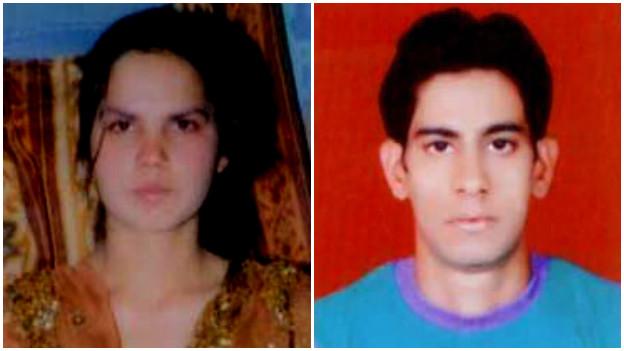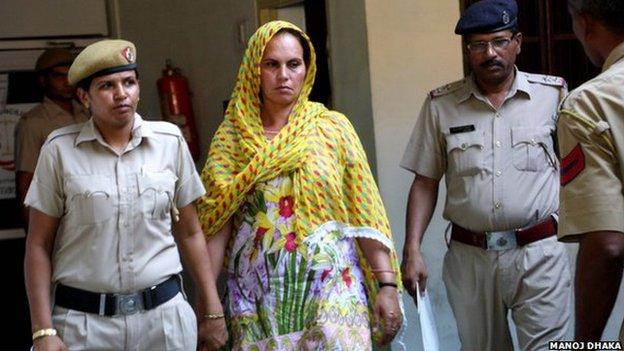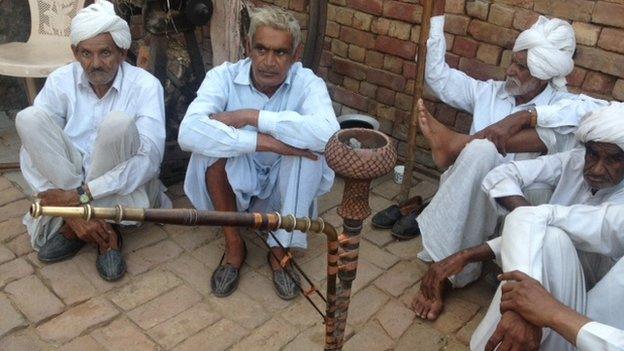India 'honour killings': Paying the price for falling in love
- Published

Nidhi and Dharmender were murdered allegedly by Nidhi's family
A young couple who were planning to marry were brutally murdered in the Indian state of Haryana on Wednesday. Police are treating the case as an "honour crime". The BBC's Zubair Ahmed visited the village in Rohtak district where the incident took place.
There were about two dozen grim-faced people - all men - waiting at the village cremation ground for the body of a young woman who was beaten to death allegedly by the same waiting crowd.
An hour ago, just before I reached the village, the same group had lit the pyre of the woman's boyfriend.
He was murdered, allegedly by the same people, and police officers said his "hands were cut off, legs chopped off and head severed from the body".
And soon, the two pyres were burning side-by-side. The woman and the man's families together attending the last rites of the murdered couple.
Dharmender Barak, 23, and Nidhi Barak, 20, were allegedly killed by members of Nidhi's family in Garnauthi village in the northern state of Haryana on Wednesday evening.
First, Nidhi was beaten to death and then Dharmender was dismembered alive.
No remorse
Nidhi's parents and an uncle have been arrested. A fourth villager - a driver - has also been held. Police say they are treating the double murder as an "honour crime".

Nidhi's mother is among the four people arrested for the murders
At the funeral on Thursday, I was searching for remorse or guilt on the faces of the men present at the cremation ground, but there was none forthcoming.
"Who wants to kill their own children? But whatever God wanted, happened," said a relative of Nidhi.
A man who identified himself as Nidhi's uncle looked dazed, or even bewildered.
When I asked him to explain why two young people were so brutally murdered, his eyes quickly filled with anger and his reply met with approving nods: "What was done to them was the right thing to do. We had to set an example."
An example for other young men and women to not fall in love.
Rural-urban divide
"Our culture is not like you have in the city. Here our women live behind curtains," said a young man in the crowd.
"The village doesn't approve of love affairs here. They were from the same caste, lived in the same lane in the same village," said another.
The man and the woman belonged to the same Jat community and shared the same gotra - the sub-caste - which made them brother and sister, he explained politely.
I took a round of the village to explore if anyone had differing views. I found none. The neighbouring villages too approved of the killings.

The villagers say they do not approve of love affairs
They all said they would not allow young men and women to fall in love as this would "dilute their values".
Some spoke of the "decadent western" culture of urban India and how it conflicted with the old, traditional values of rural India where falling in love is taboo.
There are no authentic figures of honour killings in India but such occurrences are not uncommon. Experts say they are not as frequent as in Pakistan and Afghanistan, but they do happen in northern India.
While driving back to Delhi, I saw a young couple riding a motorcycle on the city's wide road.
The woman was holding on to the man firmly. No one even noticed them. But this would amount to an outrageous act in the village where Dharmender and Nidhi were murdered.
The distance between Delhi and the village is less than 100km (62 miles). But the chasm in values and mindset is much deeper.
- Published30 July 2012
- Published17 June 2010
- Published5 October 2012
- Published10 May 2011
- Published11 May 2012
- Published20 April 2011